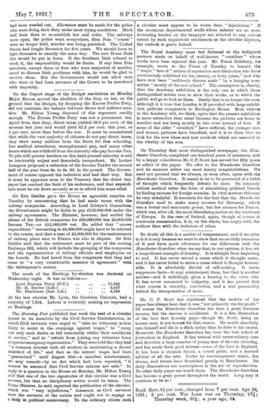On the Report stage of the Budget resolutions on Monday
Major Barnes moved the abolition of the duty on tea, on the ground that the Budget, by dropping the Excess Profits Duty, did not maintain the balance between direct and indirect taxa- tion. Mr. Hilton Young disposed of this argument readily enough. The Excess Profits Duty was not a permanent tax. Apart from that duty, direct taxes yielded 59.6 per cent. of the revenue last year and would yield 62.3 per cent. this year, or 5 per cent. more than before the war. It must be remembered that while the vast majority of citizens do not pay direct taxes, they draw many millions from the State for free schooling, free medical attendance, unemployment pay, and many other boons which are withheld from the minority who pay Income Tax. To pile still greater burdens on this hard-pressed minority would be intolerably unjust and financially inexpedient. Mr. Locker Lampson proposed a reduction of the Income Tax for the second half of the year from 6e. to 5s. 6d. in the pound. The Govern- ment of course opposed the reduction and had their way. But it must be apparent even to the Treasury that the direct tax- payer has reached the limit of his endurance, and that expendi- ture must be out down severely so as to afford him some relief.


































 Previous page
Previous page